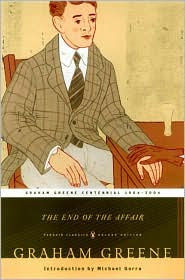
The problem with having a reputation as a Catholic novelist is that inevitably your novels will be judged on a basis greater than literary. Whether or not the story works or holds together takes a back seat to whether the novel presents an appealing and workable version of Catholicism. Catholic readers want their faith upheld for its virtues while religious skeptics may be looking for the author to make the case for the existence of God.
Graham Greene's The End of the Affair is considered a classic of Catholic literature, but for the life of me I don't understand why. This may be a personal shortcoming but to me the version of religious belief presented by Greene is a scary and false perversion of what Christianity should be.
The End of the Affair centers on a love triangle, which becomes a square when God enters the picture. Novelist Maurice Bendrix has a passionate affair with Sarah, who is married to Henry Miles. Henry's stodginess and prudishness drive Sarah to Maurice's arms, and she loves him despite his jealous nature. During a bombing (the setting is WWII London) Maurice is trapped under rubble and Sarah, thinking him dead, prays to God, promising to leave Maurice if God will let him live.
Of course, Maurice isn't dead and is perplexed when Sarah leaves him with no explanation. Convinced there is another man, he hires a detective to follow Sarah, eventually learning of her pledge when the private eye steals her diary.
The novel then follows Maurice's attempts to get Sarah back, and her refusals due to her new-found religious belief.
As a story the novel is slightly above average. Greene is good at establishing characters, and though the plot is thin even for such a short novel it is well-constructed.
But as a work of Catholicism is inherently flawed. Sarah's reason for believing, despite the fact that she desperately wants Maurice back, is a shallow and insupportable faith. The novel establishes the shallowness as a virtue in the last few pages, when several inexplicable miracles occur, ostensibly due to Sarah's belief in God.
I don't feel like getting into it, but this kind of thing upsets me, and I believe that it should upset thinking Catholics as well. It's tough to grade the novel, as it's not clear to me whether or not Greene intended his book to be representative of a true Catholicism or whether that has just been ascribed to him. Overall, I'm just having trouble imagining who I would recommend this book to.


No comments:
Post a Comment